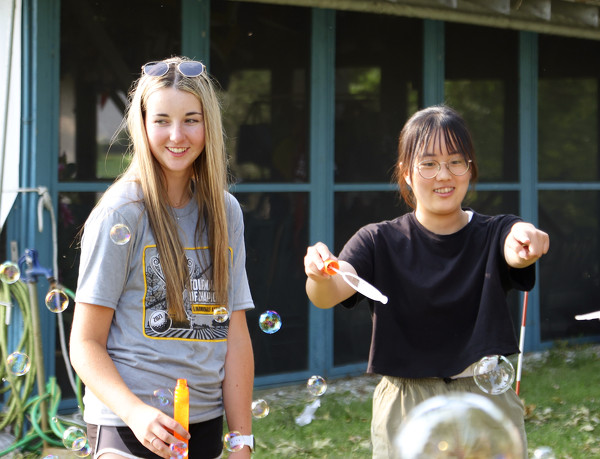
Celina High School student Maddie Fleck, left, and a student from Minamiawaji, Japan, Celina's sister city, blow bubbles.
CELINA - At first, the interactions between a group of Japanese and American teenagers were subdued, marked by awkward glances, few words and a preoccupation with their cellphones.
But after pairing up for a series of activities and games, the teens overcame the language barrier and cultural differences and warmed up to one another. After all, most children, whatever their origin, like to have fun.
"By day three, they're out here having a kickball tournament, having the time of their lives, and now they're all on Snapchat or WhatsApp. So they're all taking pictures and sending them to each other, even though they're at different homes at night," said Julie Fleck of the Grand Lake International Association.
GLIA coordinated a youth exchange from Minamiawaji, Japan, Celina's sister city. GLIA and host families welcomed 10 students aged 14-18 and three adult chaperones during their weeklong stay in the area.
This is the first time a Japanese delegation has arrived in Mercer County since the pandemic. A trip planned for 2021 was nixed due to Japan's ongoing concerns about COVID, according to Fleck.
"It's actually pretty rigorous from Japan's side. They had to apply," Fleck said of the delegate selection process. "They have to go through an interview process, they have to write an essay and then, finally, are chosen by the city."
Minamiawaji is somewhat similar to Mercer County in that it has a strong agricultural-based economy. As a group, the students researched Mercer County before arriving here.
Fleck characterized the teens as "very culturally-aware students."
"Definitely they're kids that want to come over, whose parents want them to come over as well," she said. "Some are a little shy but most of them have had English since second or fourth grade at school."
The students have a good grasp of reading English but appeared not to be as proficient speaking the language. Exchange households often relied on Google Translate to aide communications, Fleck said.
Organizers prepared an extensive itinerary that found the exchange students busy from 9 a.m. to at least 4 p.m. each day. They toured businesses, including The Daily Standard, schools, local government sites and parks. They also shopped, went bowling, took bike rides, enjoyed Celina Lake Festival, met with mayors, fished, ate at restaurants and spent time with their host families.
"The homestay is probably the favorite (part) because they immerse themselves in families for the week," Fleck said.
The students enjoyed the area's friendly, inviting culture whose social etiquette is less restrained and decorous than that of Japan, according to Fleck.
"They love it. It's a little more conservative in Japan, definitely in the households, so when they are here and the kids get to be a little bit crazier and have a little more outwardly fun, that's different for them," Fleck said.
The Japanese teens really got a kick out of a birthday party with all the commotion stirred up by lots of children.
"They just think that's a riot. It's so cool to see the interactions between the American kids because they want to learn as much about Japan as these kids want to learn here," Fleck said.
At the last minute, Elizabeth and Gary Muether of Celina were asked to host a Japanese student, 15-year-old Aoba.
"It was a good educational experience, I think, for everybody. My daughter's been wanting to have an exchange student for quite some time and we've just never had the opportunity to," Elizabeth Muether said.
Aoba, who knew a little English, taught the family how to do origami, loved their pet dog, cat and pig and relished the home-cooked American foods served to her. Elizabeth Muether said she was surprised when the teen finished a giant bacon cheeseburger from Happy Daz restaurant in Celina.
When taken to Mercer County District Library where Elizabeth Muether works as director, Aoba was amazed at the amount of resources available to the public, including Nintendo Switch games. Aoba said that is unheard of in Japan.
After learning Aoba has an interest in rocks, the Muethers' oldest son dusted off his own extensive collection and spent an hour showing different pieces to the Japanese teenager.
Aoba also often pointed to the area's vast farmlands, noting instead of corn and soybeans, onions and rice fill the fields of her home.
"It gave us, certainly at least half of our family - my daughter, myself and my oldest son, Jordan - the desire to travel and go see Japan, just because of the way she described it," Elizabeth Muether said.
Carl and Michele Huber of Celina hosted two 18-year-olds, Rino and Mao. They said this is probably the tenth time they've provided accommodations for Japanese visitors.
"I think it opens our eyes to be more understanding and accepting to other people," she said.
"Just an experience for the kids, too," her husband added.
"We don't have to look the same, we don't have to dress the same and we don't have to eat the same foods or like the same things or even speak the same language to find something in common," Michele Huber said. "So when you send them to college or you send them out into the workforce and they come into contact with other people from other cultures, it's no big deal."
During their final day in Celina, the Japanese delegates on Tuesday evening were treated to a lakeside cookout. Many host families were sad to see the teens leave.
The group was presented with a quilt featuring the 88 counties of Ohio. Coldwater Elementary School teacher Francesca Niekamp's students had pieced together the quilt in 2003 in celebration of Ohio's bicentennial.
"Those students would be thrilled to know that that's where it's going," Niekamp said. "I make a quilt probably every year with my students for the past 20 years, and how many quilts do I need to keep or display? So I think it's a perfect idea for them to give (it as a gift)."
Fleck said GLIA will soon assemble a delegation to send to Japan during this time, before band and athletic camps, next year. Applications should roll out in a few months as well as fundraisers to offset the cost of the trip.
In spring 1996, Celina and Nandan-cho, Japan, became sister cities through agreements signed at ceremonies in each community after four years of exploration and introductions. Nandan-cho's economy was similar to Celina's, based on industry and agriculture, and included rural development, coastal fishing, resort areas, farms and villages.
A group of Celina politicians, community members and agriculture professionals traveled to Japan several years ago before the project became a youth exchange spearheaded by the Grand Lake International Association.
In 2005, Nandan-cho merged with other towns to form Minamiawaji, a city with a population of about 50,000 people.
